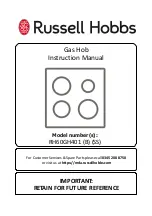
5
Elements that may damage the appliance
Caution!
■
Rough pan bases may scratch the hob.
■
Avoid leaving empty pots and pans on the hotplate. Doing so
may cause damage.
■
Do not place hot pans on the control panel, the indicator
area, or the hob frame. Doing so may cause damage.
■
Hard or pointed objects dropped on the hob may damage it.
■
Aluminium foil and plastic containers will melt if placed on the
hotplate while it is hot. The use of laminated sheeting is not
recommended on the hob.
Overview
The following table presents the most common damage
caused:
Protecting the environment
Unpack the appliance and dispose of its packaging in such a
way that no damage is caused to the environment.
Environmentally-friendly disposal of waste
products
Energy-saving advice
■
Always place the correct lid on cookware. Cooking with an
uncovered pan will result in a four-fold increase in energy
use. Use a glass lid to provide visibility and avoid having to
lift the lid.
■
Use cookware equipped with a solid, flat bottom. Curved pan
bases increase energy consumption.
■
The diameter of the pan base must match the size of the
hotplate. If not, energy may be wasted. Note: The
manufacturer normally indicates the pan's upper diameter.
This is normally greater than the diameter of the pan's base.
■
Choose cookware of a size suited to the amount of food you
are going to cook. A large pan that is only half full will use a
lot of energy.
■
Use a small amount of water when cooking. This saves
energy, and vegetables retain their vitamins and minerals.
■
Select a lower power level.
Induction cooking
Advantages of induction cooking
Induction cooking represents a radical change from the
traditional method of heating; the heat is generated directly in
the pan. It therefore offers a number of advantages:
■
Time savings for cooking and frying; since the pan is heated
directly.
■
Energy is saved.
■
Care and cleaning are simpler. Foods that have spilt do not
burn as quickly.
■
Heat and safety control; the hob supplies or cuts off power
immediately when the control knob is turned on. The
induction hotplate stops supplying heat if the pan is removed
without having previously switched it off.
Suitable pans
Ferromagnetic pans
Only ferromagnetic pans are suitable for induction cooking,
these may be made from:
■
enamelled steel
■
cast iron
■
special cutlery for stainless steel induction pan
To determine whether a pan is suitable, check to see if a
magnet will stick to it.
Damage
Cause
Measure
Stains
Food spillage
Immediately remove spilt food using a glass scraper.
Unsuitable cleaning products
Only use cleaning products specifically designed for glass-ceramic hobs.
Scratches
Salt, sugar and sand
Do not use the hob as a tray or working surface.
Pans with rough bottoms may scratch
the glass ceramic
Check pans.
Fading
Unsuitable cleaning products
Only use cleaning products specifically produced for glass-ceramic hobs.
Contact with pans
Lift pots and pans before moving them around.
Chips
Sugar, substances with a high sugar
content
Immediately remove spilt food using a glass scraper.
This appliance conforms to the Waste Electrical and
Electronic Equipment Directive WEEE 2002/96/EC.
This directive defines the framework for recycling used
appliances within European territory


































